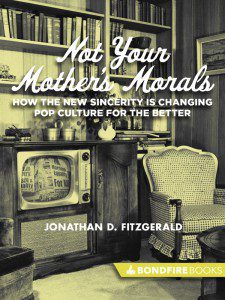 I’ve suggested for some time that one key distinction between modernism and postmodernism is that, whereas modernism values perfection, postmodernism prefers authenticity. Author, blogger, editor and uber-hipster Jonathan D. Fitzgerald more or less agrees with me, so of course, I dig him.
I’ve suggested for some time that one key distinction between modernism and postmodernism is that, whereas modernism values perfection, postmodernism prefers authenticity. Author, blogger, editor and uber-hipster Jonathan D. Fitzgerald more or less agrees with me, so of course, I dig him.
I sat down with Jon (and by “sat down,” I mean I emailed him some questions and he emailed back) to chat about how this ethos of authenticity and hyper-sincerity is not only bubbling up within Christianity, but throughout contemporary western culture. What does it tell us about ourselves? Will it last? And perhaps most important: does this blog make my butt look fat?
In Not Your Mother’s Morals: How the New Sincerity is Changing Pop Culture for the Better, Jonathan D. Fitzgerald argues that today’s popular music, movies, TV shows, and books are making the world a better place. For all the hand-wringing about the decline of morals and the cheapening of culture in our time, contemporary media brims with examples of fascinating and innovative art that promote positive and uplifting moral messages–without coming across as “preachy.”
The catch? Today’s moral messages can be quite different than the ones your mother taught you. Fitzgerald compares the pop culture of yesterday with that of today and finds that while both are committed to major ideals—especially God, Family, and Country—the nature of those commitments has shifted.
What is new sincerity and why does it matter?
Sometime around the turn of the century, the attributes of sincerity and authenticity rose to prominence in American culture; in a way, they’ve become our most treasured virtues. In my book, I argue that this is great news because these postures allow us to consider topics such as spirituality and morality in refreshingly open ways.
Can you offer examples of this trend manifesting itself in the culture?
Sincerity is everywhere in pop culture, but since I just watched it last night and thus it’s a fresh example that I’ve never used before, I submit that the film “Silver Linings Playbooks” is a great example of the New Sincerity.
It’s heartbreakingly honest and, if it wasn’t for the heartbreaking part, it might come across as kind of saccharine sweet. But by being sincere before just about anything else, a number of serious issues such as mental illness, fidelity, and addiction are considered in what is essentially, after all, a romantic comedy.
What would this look like in a Christian community context, and how is it different than what’s been done in the past?
I actually think the most relevant application for Christians is the recognition of just how much we’ve missed the movement. Evangelical subculture has been inherently insincere and inauthentic by virtue of trying to imitate “secular” culture. The New Sincerity presents a great opportunity for Christians to join in, to be a natural part of the larger cultural conversation. But first we have to stop trying to “engage” everything all the time.
How is New Sincerity different than the Radical Honesty movement?
Honestly (see what I did there?), I had never heard of the Radical Honesty movement before now. So, naturally, I googled it. I think the primary difference, from what I can tell (read: what Wikipedia told me) is that Radical Honesty is an intentional means of self-improvement and the New Sincerity, to this point at least, organically arose in response to prevailing winds in culture. That is, you can’t — I don’t think — try do the New Sincerity. Chances are, you’re already in it.
It seems like sincerity requires a degree of trust that really only comes from face-to-face relationship. How do you cultivate this in a society allows for such superficial relationships and anonymity that trolls and character assassins abound?
You know, it’s interesting, since about 2008, when my wife and I moved to New York City, most of my closest relationships began online before becoming face-to-face. When done right, and maybe especially for not particularly outgoing writer types, social media can actually be a means of cultivating sincerity.
Now, obviously, it can also do the exact opposite, and probably that’s what happens most often, but I don’t think that anything about the internet necessarily stands in the way of very sincere relationships. I actually think your ten questions model that kind of thing all the time — unless you get a lot of liars, in which case I’m doing it wrong.
 So New Sincerity is, in a sense, sharing about yourself in a radically open way. But how do you keep this from not becoming narcissistic? Where does the listening enter in?
So New Sincerity is, in a sense, sharing about yourself in a radically open way. But how do you keep this from not becoming narcissistic? Where does the listening enter in?
This is the biggest threat to the New Sincerity as a positive movement. There’s always the looming threat that trying to be true to oneself leads right into narcissism. And, honestly, I’m not sure how to protect against that except to remember that we can only be most fully ourselves in community with others who helps us be that.
One of the objections some people have to this style of media and dialogue is that it seems to have no boundary. Where do we draw the lines of propriety? Or do we?
Oh, I hope so. “Girls” is probably the prime example of this right now, and I kind of wish — maybe prudishly — that the boundaries were a bit clearer on that show. But boundaries will continue to push out; it’s inevitable. My guess, based on how culture works, is that we’ll hit a certain point and, as a whole, the culture will swing back a bit and reign it in, before stretching back out. This seems to be how boundaries work in popular culture.
When does this kind of edgy, sometimes shocking, sincerity become its own worst enemy? In other words, when does it become a sort of defense mechanism rather than a means for deeper intimacy?
Yeah, so, back to “Girls.” I actually think Lena Dunham uses sincerity as a kind of defense mechanism. I think that she beats you to the punch — you can’t call her fat because she already did it. And then she takes all her clothes off just to prove it. This isn’t necessarily a bad thing, except to the extent that it veers off into narcissism.
I use Girls as the example for these last two questions because it’s produced by Judd Apatow, who, starting with “Freaks and Geeks” and through each of the films he’s involved with either as producer, director, or writer, has been the champion of the New Sincerity. So it’s interesting to see where he and “Girls” take the movement next.
Who do you hope read your new book, and what do you hope they get out of it?
The book really is aimed at a wide audience of pop culture consumers, but probably more specifically to those who enjoy thinking about pop culture instead of just passively consuming. It will be of particular interest to anyone who, like me, grew up in a conservative, borderline fundamentalist Christian community that demonized pop culture because they, like me, probably love it all the more for that reason.
* * *
Jonathan D. Fitzgerald is a writer and educator whose work most often considers the various manifestations of religion in culture. He is an editor at Patrolmag.com and a contributor to the popular religion website, Patheos. Not Your Mother’s Morals is his first book.











